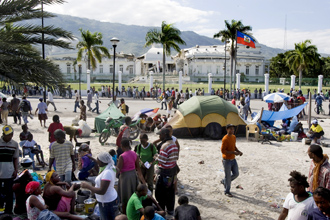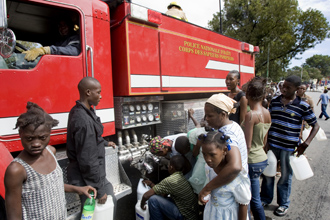Unique Challenges for Aid Community in Haiti
The massive earthquake that devastated Haiti, leveling the capital city of Port-au-Prince, has created a humanitarian crisis that the international community is still scrambling to address. To effectively reach the Haitian people, the outpouring of aid from across the globe must overcome a unique set of hurdles, says Ky Luu, executive director of the Tulane Disaster Resilience Leadership Academy.

Outside the ruins of the Haitian National Palace in Port-au-Prince, citizens left homeless by the earthquake have set up tents. (Photos by Marco Dormino/The United Nations)
"One of the biggest problems in terms of disaster response is effective coordination to make sure the right assistance is being targeted to the right individuals," says Luu.
The convergence of many groups trying to get people and supplies "in country" can be as much hindrance as help, says Luu, the former director of the U.S. Agency for International Development's Office of Foreign Disaster Assistance.
"As much as the international community wants to deploy teams or bring in assistance, there's going to be a bottleneck effect. There's only so much the airport can handle or roads that have been cleared," says Luu. "There's most likely not enough basic things like forklifts to offload supplies from the planes or vehicles to move supplies from the airport into affected areas."

Haitians wait in line for water distributed by Haitian firefighters near the presidential palace.
Luu also points to security problems that will likely arise due to damage and casualties sustained by United Nations peacekeeping forces stationed in Haiti before the earthquake.
Luu says the U.N. played an instrumental role quelling violence at food-distribution sites following hurricanes that also devastated the island nation in 2008.
He directs people eager to help to an umbrella organization for non-governmental organizations called InterAction. There they can learn which organizations are in Haiti and decide where their donations should go.
Luu stresses that this disaster should be viewed within the context of a longer time frame than the next few days or weeks.
"We should not be shortsighted about only managing the effects of the earthquake and forget about the fact that six months or two years from now people will still need help."
